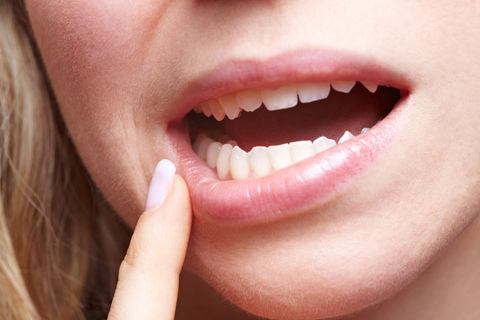February 3rd, 2016

Dr. Gregory Weaver will tell you that while you are sleep, your mouth may be very active. If you find yourself waking up with headaches, facial pain, neck aches, or a sore jaw, you may have tooth grinding, a condition we also call bruxism.
We see many people who experience some extent of tooth grinding, but a very small percentage of the population actually experiences symptoms severe enough to warrant visiting a doctor. If you continually experience any of the symptoms listed above, we encourage you to give us a call at our Raleigh, NC office so that we may be able to diagnose and treat the problem.
The most common treatments include:
- Reducing your stress level to help relax your jaw muscles and prevent grinding
- A custom-made night guard to cushion your teeth and protect them from damage
- Changing your eating habits. Coffee, tea, or alcohol before bed can increase your chance of nightly grinding
- If your jaw or teeth are misaligned, Dr. Gregory Weaver may also recommend a brace to decrease grinding.
Grinding your teeth can have serious consequences that, if left untreated, can lead to tooth fractures and damage to the TMJ (temporomandibular joint).
If you think your teeth may not be getting the rest they need at night, we encourage you to give us a call and schedule an appointment with Dr. Gregory Weaver. Call us today!
January 27th, 2016

According to the International Congress of Oral Implantologists it is rare that your body will reject your dental implants. However, this does not mean that your dental implant will not fail. A successful dental implant is one that is placed in healthy bone and is properly cared for after the surgery takes place.
There is only one major reason why a dental implant would be rejected: a titanium allergy. The majority of dental implants are made with titanium because it has proven to be the most biologically compatible of all metals. On average, less than one percent of potential dental implant recipients reported an allergy to titanium.
Dental Implant Failure
The most common cause of dental implant failure in the upper and lower jaw is bacteria. Everyone has bacteria in their mouth. If you have bacteria in your jawbone at the time of your dental implant, it can spread from implant to implant, causing dental implant failure.
If you do not take proper care of your dental implants, that could also cause them to fail. You also have to take proper care of the implant and keep your mouth clean. The development of excessive bacteria around the implant and in surrounding tissues can lead to implant failure.
Teeth grinding is another reason dental implants fail. When you grind your teeth, it can move the implants out of position. Therefore, you should wear a mouthpiece when you go to sleep if you know you grind or clench.
If you take care of your implants by practicing good oral hygiene and visit our Raleigh, NC office, you should not have any problems with your new dental implants. As always, ask Dr. Gregory Weaver about any questions or concerns you have about you dental implants.
January 20th, 2016

The earliest sign of gum disease is called gingivitis (sometimes called periodontal disease), and is an inflammation of the gums. If left untreated, gingivitis can lead to gum tissue loss, loss of bone that supports the teeth, and eventually tooth loss. The good news is that gingivitis is easily treatable at Weaver Dentistry. Better yet, gingivitis is nearly 100 percent preventable.
Gingivitis is usually caused when plaque and bacteria accumulate on the gums, generally due to poor oral hygiene. A patient with gingivitis will have red and puffy gums that will likely bleed when he or she brushes or flosses.
It is almost entirely within our patients’ power to prevent gingivitis by brushing and flossing on a daily basis. In addition to good oral health habits, regular visits to see Dr. Gregory Weaver will also help with early detection. We can often detect minor inflammation and other signs of gingivitis before it causes any discomfort or issues.
If left untreated, gingivitis will eventually progress to periodontitis, a breakdown of the tissue and bone that support the teeth. Smokers, women who are pregnant or menopausal, people with heart disease, diabetes, epilepsy or HIV infection, and people who suffer from poor nutrition are more likely to have gum disease.
To learn more about gingivitis, or if you suspect you have gingivitis, we encourage you to give us a call at our Raleigh, NC office today!
January 13th, 2016

As you grow older, your mind may be preoccupied with the health of your bones, heart, or brain. However, our team at Weaver Dentistry will tell you that keeping your teeth healthy is an equally important part of the aging process. Older adults are at increased risk for a variety of oral health conditions, which makes it essential for you to speak with your dentist to create a prevention plan that’s best for you.
Oral health conditions associated with aging
Just as the rest of your body continues to change as you age, your mouth changes, too. Certain conditions become more likely to develop as you reach older adulthood, including:
- Dry mouth. Although your salivary glands continue to produce saliva as you get older, medications and chronic health problems often cause dry mouth.
- Root decay. Your teeth have lasted you a lifetime, but improper nutrition or cleaning may lead to decay at the roots of your teeth.
- Diminished sense of taste. Your eyesight and hearing aren’t the only senses affected by aging. The ability to taste naturally diminishes over the course of older adulthood.
- Tissue inflammation. Are your gums tender, bleeding, or inflamed? Tissue inflammation may indicate gum disease or may be a consequence of wearing dentures that don’t fit well.
- Oral cancer. Risk for most cancers increases with age, and oral cancer is no exception. Older adults are at increased risk for oral cancer compared to younger individuals.
Ways you can prevent dental problems
Fortunately, many age-related oral health problems are preventable. Begin by improving your diet to include plenty of fruits and vegetables. Choosing water over coffee or soda will keep your teeth whiter and cavity-free. Also remember to practice good brushing habits to prevent cavities and gum disease.
Visiting the dentist at least twice a year is vitally important when you reach older adulthood. Your dentist is familiar with your oral health and may be the first person to notice a sore, discolored patch, inflammation, or other abnormality that indicates oral cancer or gum disease.
If you’re experiencing any problems with dental health, let your dentist know immediately. Together, you can troubleshoot solutions and create a plan that keeps your mouth and gums healthy.
For more information, or to schedule an appointment with Dr. Gregory Weaver, please give us a call at our convenient Raleigh, NC office!




